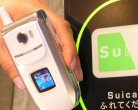Vodafone Introduces Additional Anti-spam Measure
Vodafone K.K. has announced a new function will be introduced starting 30 March that blocks so-called “spoof mails”, mails sent via a PC with addresses posing as mobile handset mail addresses. With the new anti-spam measure, Vodafone K.K. aims to make its Vodafone live! mobile Internet service more dependable for customers. The spoof mail blocking function makes it possible to refuse mails sent via a PC that pose as mail addresses of Vodafone K.K., other mobile operator, or PHSNote 1 handsets. By accessing the Custom Mail Set-up page from either Vodafone live! or the Vodafone K.K. website (www.vodafone.jp), customers can select from the “accept (default setting)” or “refuse” settings to filter spoof mails.


 Mass transit meets mobile technology for Tokyo commuters in a new service enabling NTT DoCoMo FeliCa-equipped i-mode cell phones to function as Suica JR train commuter cards. The new service will combine DoCoMo’s FeliCa smart card e-money platform with the Suica IC train commuter card (both using technology developed by Sony) into one mobile handset that can simultaneously pay for train tickets, commuter passes, airline and movie tickets and purchases at any of 14,000 — and counting — retailers.
Mass transit meets mobile technology for Tokyo commuters in a new service enabling NTT DoCoMo FeliCa-equipped i-mode cell phones to function as Suica JR train commuter cards. The new service will combine DoCoMo’s FeliCa smart card e-money platform with the Suica IC train commuter card (both using technology developed by Sony) into one mobile handset that can simultaneously pay for train tickets, commuter passes, airline and movie tickets and purchases at any of 14,000 — and counting — retailers.